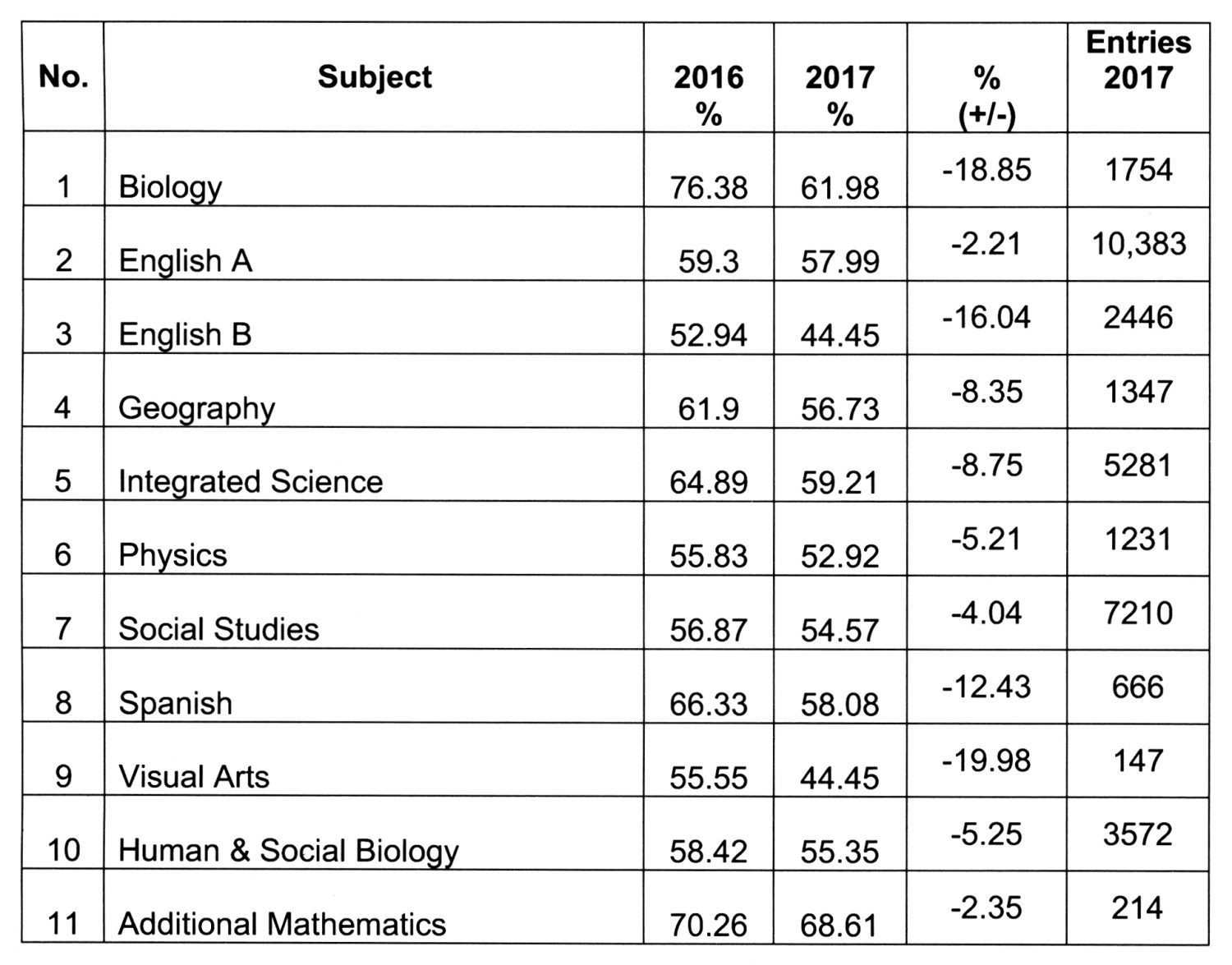The sombre tone which pervaded the atmosphere during the announcement of this year’s Caribbean Secondary Education Certificate (CSEC) results suggested that once again the Ministry of Education was not satisfied with the performance of the nation’s students. This is despite a 0.46% improvement in the national pass rate.
According to Minister of Education Nicolette Henry the slight increase to 63.68% pass rate does not make up for the less than satisfactory performance in Mathematics and English.
“Our focus is on quality not quantity…from a qualitative perspective our focus is to ensure students in secondary are able to matriculate; that is to pass Maths and English,” she explained.
Chief Education Officer Marcel Hutson echoed the Minister’s sentiment noting that while a small number of students are writing a large number of subjects the Ministry cannot afford to have either teachers or student spread themselves too thin at the expense of matriculation.
He stressed that while those students who have so far attempted in excess of 15 subjects have all matriculated, the Ministry is focused on bolstering those schools especially Junior secondary schools which have displayed weaknesses.
“We are concerned about all our schools,” he stressed, noting that the Ministry has instituted a system of increased supervision and detailed teacher assessment to determine where teachers are and definitively address areas of concern.
He further explained that a number of systems such as the Guyana Secondary Improvement Project and the National Subject Committees have been and are being put in place to improve performance.
Henry added that it is important that the MoE take responsibility and institute needed structural intervention.
Memorandum
Policymakers have claimed that a memorandum which was circulated in June and which advised that students would not be allowed to pursue subjects across academic streams would not in fact place a cap on the number of subjects students are able to write.
They stressed that its intention and contents have been misinterpreted and claim it makes provisions for special circumstances.
This year 39.23% of the students who wrote mathematics attained at least a Grade III pass, a minimal improvement over the 38.37% pass rate in 2016. It is however less than the 45.07% who passed the subject in 2015.
Additionally while 57.99% of the students writing English A earned at least a Grade III this represented a decline of 2.21% from last year’s 59.3% pass rate.
The most shocking drop in performance was however recorded in English B (Literature) which saw pass rates move from 52.94% in 2016 to 44.45% in 2017.
The two English Subjects are two of 11 subjects which the Ministry said recorded results which were below expectations.
The other 9 are Biology which declined from 76.38% to 61.98; Geography from 61.9% to 56.73%, Integrated Science 64.89% to 59.21%, Physics 55.83% to 52.92%, Social Studies 56.87% to 54.57%, Spanish 66.33% to 58.08%; Visual Arts 55.55% to 44.45%, Human & Social Biology 58.42% to 55.35% and Additional Mathematics 70.26% to 68.61%. (See box)
In contrast to these performances a 100% pass rate was registered in Music and Theatre Arts.
Outstanding performances were obtained in 10 subjects where over 90% of students gained at least a Grade III.
The subjects included Music and Theatre Arts as well as Physical Education and Sports with 99.01% passes, Agricultural Science (DA) with 98.57% passes, Electronic Document Preparation and Management with 97.25% passes, Religious Education with 96.75% passes, Food Nutrition and Health with 91.16% passes, Industrial Technology (Building concentration) with 94.75% passes, Information Technology with 92.62% passes and Agricultural Science (SA) with 92.31%.
Improved performances are evident in 14 subjects including: Chemistry, Electronic Documentation Preparation and Management, Economics, Office Administration, Principles of Accounts, Principles of Business, Religious Education, Caribbean History, Textile Clothing and Fashion, Family and Resource Management, Food Nutrition and Health, Industrial Technology Building, Industrial Technology Electrical and Industrial Technology Mechanical.
Four subjects delivered a consistent performance. Those were Agricultural Science (SA) with a pass rate of 92.31% in 2017, compared to 92.61% in 2016; French with a pass rate of 80% in 2017, compared to 79.86% in 2016; Mathematics with a pass rate of 39.23% in 2017, compared to 38.37% in 2016 and Physical Education & Sport with a pass rate of 90.01% in 2017, compared to 98.93% in 2016.
One new subject was offered this year, Portuguese with 83.04% of the entries achieving acceptable grades.
In total 12,684 candidates registered to sit 35 subjects at this year’s CSEC, compared to 12,809 for 2016, an increase of 1%.
Guyana achieved a 63.68% pass rate against 63.39% in 2016. Specifically 12.49% of the entries attained Grade I, 22.72% attained Grade II and 28.47% attained Grade III.





